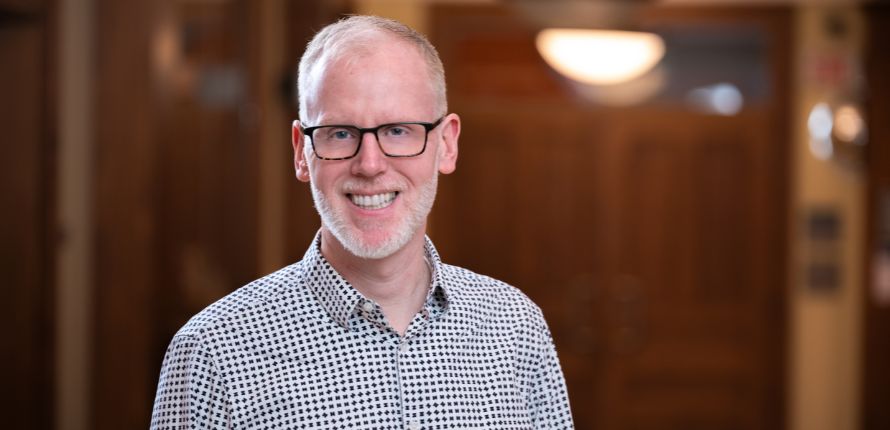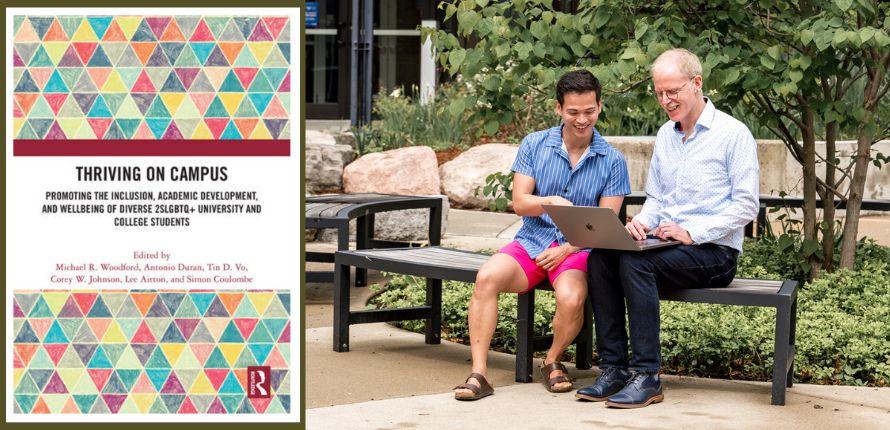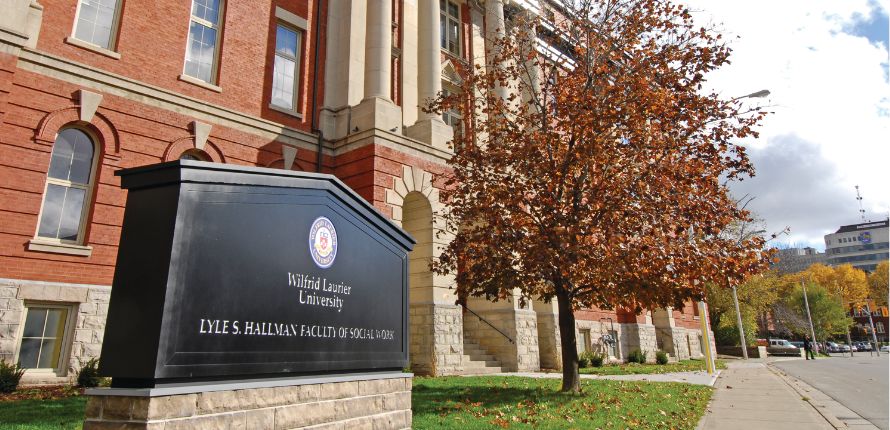We use cookies on this site to enhance your experience.
By selecting “Accept” and continuing to use this website, you consent to the use of cookies.
Search for academic programs, residence, tours and events and more.
Sept. 10, 2025
Print | PDFOn July 1, Michael Woodford began his three-year term as dean in the Lyle S. Hallman Faculty of Social Work at Wilfrid Laurier University.
A member of the Laurier community since 2014, Woodford has held senior positions within the Faculty of Social Work, including as associate dean of the faculty’s doctoral program from 2020 to 2024 and interim dean in July and August of 2021. Woodford is a widely published expert on the inclusion, exclusion and well-being of 2SLGBTQIA+ communities, especially students on postsecondary campuses. He is celebrated for his excellence in teaching and mentorship at Laurier.
Below, Woodford discusses his pathway into social work, his vision for the faculty during his tenure and advice to incoming students.
What does social work mean to you?
For me, social work is both personal and transformative. It is about creating meaningful change — whether through clinical practice, community engagement or policy development.
Tell us about your background in the field and the types of experiences you bring to your work at Laurier.
I originally planned to become a high school math teacher, but after taking a social work course out of curiosity, my path changed. I really found my voice during my undergraduate social work studies and a space where I could engage with issues of social justice and begin to understand the systemic factors behind oppression, discrimination, poverty and other social issues.

Michael Woodford, dean in the Faculty of Social Work
My first field placement was at Newfoundland and Labrador’s only newcomer settlement agency, which significantly influenced my path. I saw firsthand the discrimination and inequities that immigrants and refugees faced. So, despite initial growing pains, I thrived as a student there, and two years later, with my Bachelor of Social Work degree in hand, I became the agency’s first social worker. That experience opened my eyes to the full spectrum of social work — not only direct practice but advocacy, community organizing, program development and systems change. While working there, I helped establish an organization to give immigrant-serving agencies in Atlantic Canada a collective voice in federal policy development.
That work, and my interest in organizations, led me to pursue a Master of Social Work (MSW) degree, which focused on social policy and administration, deepening my knowledge and skills in leadership, systems change and policy analysis. From there, I worked on policy and organizational development with the provincial government and kept engaged with community agencies as a consultant.
What inspired you to pursue the role of dean?
Since joining the Laurier community over 10 years ago, I have been continually impressed with the innovation and collaboration that happens here, especially within the Faculty of Social Work, and this is something I will build on during my tenure.
In today’s world, with growing community needs and increasing diversity, social work education must remain responsive and be inclusive of the changing community. Whether working directly with individuals or shaping systems, social workers are facilitators and change agents. I am inspired to work in a faculty that is preparing future agents of change who will provide and develop socially responsive services. That keeps me moving forward.

Thriving on Campus cover, left; Tin Vo (PhD '22) and Michael Woodford, right.
What do you hope to achieve as dean?
The Faculty of Social Work will celebrate its 60th anniversary in 2026, providing us with the opportunity to highlight the great work our students, faculty and alumni are doing and mobilize the knowledge coming out of that work. Preparing for this milestone is also an opportunity to do some visioning for the future. I want to work with faculty, staff, students, alumni and community partners across our programs on a strategic plan — one that identifies our collective goals and priorities for the next three to five years.
When I think of the work to come in my role, the image of a conductor leading the various parts of an orchestra comes to mind. We have many strengths within the faculty, and I want to make sure we are all pulling in the same direction. I am excited to be part of this transformational work that centres Social Work’s mission to advance well-being, equity, inclusion, decolonization and social justice.
You completed a sabbatical before assuming the role of dean. Tell us about your work during that time.
Mentoring the next generation of scholars is a vital part of my work. During my sabbatical, I worked with and supervised several master’s and doctoral students. It’s quite rewarding to see their passion for socially just research grow as they develop their competencies and confidence.
There is still a lot of work happening with Thriving on Campus, a multi-phase research and change project I began in 2018 to explore the experiences, strengths, well-being and academic development of diverse 2SLGBTQIA+ university students throughout Ontario. Wanting to effect change on campuses, my team prioritized community engagement and knowledge mobilization throughout the project, with mobilization ranging from institutional and community reports to webinars. Our 2022-2023 virtual conference series engaged nearly 300 campus staff and administrators from throughout Ontario to learn about 2SLGBTQIA+ students’ strengths and needs, ways to promote their inclusion and well-being, and engage in action planning.
During my sabbatical, I learned about some of the impactful changes at various schools inspired by my team’s research — things like safe space training programs, improvements in name-change policies and developing trans-affirmative care. As researchers and change agents, we’ve used data to advocate for more equitable post-secondary environments for queer and trans students, and we’ve seen real change as a result.
Like all sabbaticals, I worked on academic papers and presented my team’s research, including overseas. My colleagues and I also transformed a 2024 special journal issue we led into a book published by Routledge, which is incredible. I am working on plans to scale Thriving on Campus nationally, which is exciting, and it will be impactful to take our work across Canada.

The Lyle S. Hallman Faculty of Social Work at Laurier celebrates its 60th anniversary in 2026.
With a new academic year just starting, how do you plan to foster community within Social Work?
While community is something we all naturally long for, it takes work and must be intentional. With students, we work to create community. It starts at orientation. For example, during MSW orientation, we run a placard activity to help students identify peers, faculty and staff with whom they may have common interests. Faculty, staff and field instructors hold placards highlighting their areas of interest or practice — such as working with the disability community, youth outreach or crisis intervention — and then students are invited to engage in brief, informal conversations with those whose interests align with theirs. It is an opportunity for students to identify potential mentors and connections in a relaxed and engaging way.
I also see the faculty’s strategic planning process as a pathway to further connection and collaboration, especially across our programs and groups. While it is an opportunity to ask ourselves where we want to go and determine how we will get there, we will explore those questions together and set a collective path.
Pursuing a career in social work is not easy, given the issues often addressed. What advice do you have for Laurier Social Work students?
Your instructors, including field instructors, and our staff are here to support you, so connect with them. Also, your peers and classmates will be your greatest resource, and some will become lifelong friends. Get to know one another. Connect with someone with different lived experiences and viewpoints. Be open to new ideas and perspectives. In social work, it is important to be reflective and reflexive — why are you pursuing social work, and where do you need to grow? We all have biases and can get uncomfortable during the learning process, but much learning happens in that space. Challenge yourself, knowing you have people around you to support you as you grow.
How do you support your own well-being?
I am fortunate to work alongside a strong team of faculty and staff. I have witnessed the power of our collective efforts and believe that when we are aligned under a shared framework, real synergy emerges. That sense of unity is something I deeply value and aim to grow. Balancing everything starts with recognizing that one person can’t do it all. It’s important to set clear priorities, empowering my team and ensuring we are working toward our shared goals
I’m also intentional about saying no when necessary, keeping our priorities front and centre, and acknowledging that not everything can be achieved at once.
On a personal level, I’m supported by my wonderful partner, David. We recently celebrated our wedding in my hometown of St. John’s, Newfoundland, with our families and friends. It was a great celebration, and I got to share my love for Newfoundland with many “come from aways.”